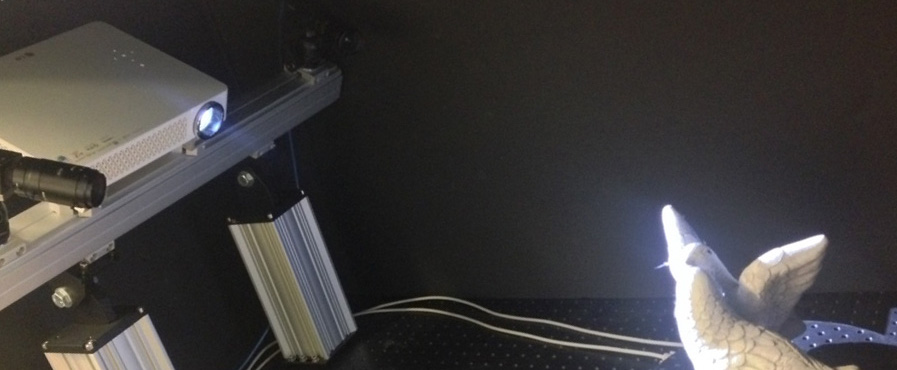3D Scanner

The SeeMaLab Scanner:
A high resolution structured light scanner with a rotation platform.
Accurate measurements of object geometry is an essential part of the 3D ecosystem. There is a great variety of optical methods for this task. These range from passive method such as structure from motion or depth from defocus, over active methods that use a light source such as structured light scanning, laser scanning, or time of flight (Kinect 2). Finally, there are volumetric methods such as x-ray based CT scanning.
Structured light is a very flexible group of methods, which can be tailored to a range of geometries and materials, and implemented using standard commercial parts. The current challenges are with non-Lambertian reflection and occlusion. Within Eco3D we work on the fusion of 3D geometry with higher order reflectance models.
3D scanning with structured light enables us to quickly digitise the geometry of an object with accuracy in the micron-range. Our 3D scanner is a reference implementation of various structured light methods (binary Gray coding, phase shifting, line shifting), and serves as a platform for the development of new scene coding strategies and surface reconstruction methods. It consists of off-the-shelf component with 9MPx cameras and a commercial HD LED projector. A calibrated micro-rotation stage enables us to capture scenes from multiple angles, which are aligned without the need for alignment algorithms.
Accuracy of our system was evaluated according to VDI 2634 with probing error form below 100 microns, probing error shape below 100 microns, sphere distance error below 150 microns and flatness below 150 microns.
Please contact us if you are interested in structured light 3D scanning. We are open for collaboration as well as student projects.
The structured light scanner is part of the SeeMaLab project which was sponsored by the H.C. Ørsted foundation.
Calibration procedure
Scan procedure
Sample scans
Software download
The complete source code and documentation can be downloaded from the following SVN repository: http://svn.compute.dtu.dk/svn/seema-scanner/